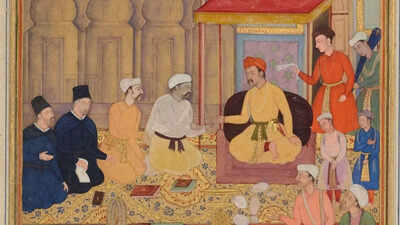ARTICLE AD BOX

Akbar, the greatest Mughal ruler in Indian history and son of Humayun, reigned from 1556 to 1605 and introduced several innovations in administration, culture, and architecture, but most importantly in the religious space of his ruling period.
He was the first to introduce the religious policy that was based on Sulh-i Kul (universal peace and harmony) between all his subjects regardless of their social, ethical, or religious identities. His religious policy did not emerge suddenly but evolved during the course of his rule and was heavily influenced by his diverse subjects. According to a study published at Columbia University, under the religious policy, Akbar introduced the Din-i Ilahi (Religion of God), a syncretic religious movement propounded by him in 1582 A.D. It was one of the most effective tactics that reduced the distance between Hinduism and Islam, which was fueled by the previous rulers. But it becomes the question of curiosity: what made him abandon his own religion, Islam, to create a new path of spiritual awakening?
Reasons that sparked Akbar’s religious questioning
Interaction with Diverse Subjects
Akbar was a benevolent ruler who extended Mughal power over most of the subcontinent.
This wide, expanded ruling allowed him to govern a population of diverse ethnicity, race, and religion. The development of Akbar's religious policy in the course of time was a result of his interaction with not only Muslim society but also other religious groups, as well as local eminent leaders and rulers. Akbar's Rajput views and his contact with Hinduism, on the other hand, made an impression on his imaginative mind.
Meanwhile, the bhakti movement had created a new atmosphere in India. As a result of this movement, a great many rulers in various parts of India adopted a more liberal policy of religious tolerance, attempting to set up communal harmony between Hindus and Muslims from the beginning of the fifteenth century.
Debates in Ibadat Khana
Akbar established the Ibadat Khan (House of Worship) to learn more about Islamic teaching through debates on various issues.
The debates in Ibadat Khana were mostly based on the existence of God, the teachings of the Quran and Hadith, Islamic law, divorce, nikkah, and more. However, when debaters started attacking each other personally. They reacted in anger to different issues, and Akbar went into a state of confusion.
In this way these debates compelled him to think about the truth of religion. In a span of time, Akbar let non-Muslim religious scholars of Hinduism, Jainism, Buddhism, Sikhism, Christianity, etc.,
take part in debates. This served as a significant factor shaping his quest for religious truth.
Akbar’s break-away from religious practices
After being the spectator of the interaction and intellectual debates between religious scholars of different religions, Akbar started deciphering these traditional practices as a medium of diverse formalities.
- He stopped offering namaz in public and withdrew from religious festivals.
- He rejected the authority of the Islamic clergy, especially those who used fatwas (religious rulings) to control political life.
- He believed that many religious scholars of different faiths promoted blind imitation over reason and exclusively over truth.
- He replaced Arabic with Persian and Sanskrit terms in court prayers.
According to the research paper published in the Columbia University Journal, Akbar, in order to gain the support of other religious and social groups, asserted new ideas and enforced some innovations in both religious and imperial fields.
Din-i Ilahi: Emergence of a new spiritual path
With the establishment of the final religious policy, Din-I Ilahi—a new state religion of ‘God-ism,’ which is a mix of Islamic, Hindu, Christian, and Buddhist teachings. According to Dabistan-i Mazahib (School of Religions), Din-i Ilahi is a religious association that followed the 10 virtues.
- Liberality and beneficence
- Forgiveness of the evildoer and repulsion of anger with mildness;
- Abstinence from worldly desires;
- Care of freedom from the bonds of worldly existence and violence, as well as accumulating precious stores for the future, real and perpetual world;
- Wisdom and devotion in the frequent meditation on the consequences of actions;
- Strength of dexterous prudence in the desire of marvellous actions;
- Soft voice, gentle words, pleasing speeches for everybody;
- Good treatment with brethren, so that they will have the precedence over our own;
- A perfect alienation from creatures and the material world, and a perfect attachment to the Supreme Being
- Dedication of the soul in the love of God
Din-i Ilahi acted as a personality cult, and the members of this cult, or the believers, were handpicked by Akbar among his courtiers who were spiritually inclined and open-minded. Notable followers like Birbal and Abul Fazi, men with intellect and tolerance, followed this path of a spiritual mindset that has no borders. There were no traditional practices like forced conversion to expand the believers of Din-i Ilahi.Also Read: Can cockroaches crawl into your ear while you’re asleep? Here’s what you need to know



.png)
.png)
.png)
















 6 hours ago
4
6 hours ago
4









 English (US) ·
English (US) ·